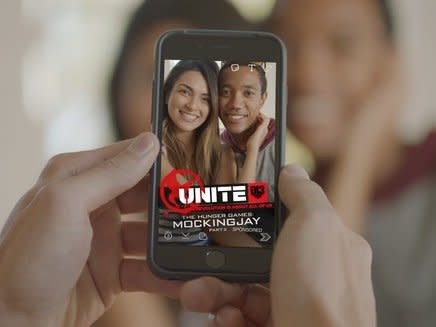Sponsored content is turning publishers into full-service agencies (FB)

Snapchat via The Motley Fool
This story was delivered to BI Intelligence "Digital Media Briefing" subscribers. To learn more and subscribe, please click here.
The proliferation of editorially-produced sponsored content is increasingly blurring the line that separates publishers and ad agencies, The New York Times (NYT) reports.
This creates new opportunities for publishers, but the revenue potential will also be determined by the limiting effects of social platforms.
Publishers’ roles are no longer limited to offering inventory for ads. In creating sponsored content, publishers are now involved in everything from the conception of a campaign to its execution and placement across the web. Publishers have thus taken on roles that resemble those historically carried out by the creative and media-planning arms of ad agencies.
The mounting popularity of sponsored content has a number of drivers:
Shrinking ad rates caused by ad-blocking and programmatic ads. Traditional ad prices are being squeezed by the increased user adoption of ad blockers, and the prevalence of programmatic ads, which has brought increased industry automation and reduced pricing inefficiencies. Publishers and advertisers have consequently turned to sponsored content as a way to sidestep these problems.
Facebook as a more attractive destination for advertisers. At the same time, Facebook is commanding a widening share of the digital ad market by promising sizable audiences and granular targeting at competitive prices. In other words, Facebook is stealing the display ad business formerly dominated by online publishers.
Brands are attracted to sponsored content’s high engagement rates. Average click-through rates (CTRs) for sponsored content are nearly 4x higher than the average CTR of traditional, nonnative display ads in the US, according to data from Polar shared with BI Intelligence. Meanwhile, News UK, which owns The Times, The Sunday Times and The Sun, found that time spent reading sponsored content was occasionally equivalent to editorial content.
A growing number of publishers have come to rely on sponsored content. Most of Vice and BuzzFeed’s business is built on sponsored content. Three-quarters of The Atlantic’s revenue comes from sponsored content, as does half of Slate’s, according to the New York Times. Sponsored content will be one of the fastest-growing native ad formats in the coming years, with revenue forecasted grow at a 31% compound annual rate to $12.6 billion by 2021, according to BI Intelligence estimates.
However, relying on social channels – especially Facebook – to distribute sponsored content poses certain risks for publishers. As per Facebook’s guidelines, all sponsored content on the platform must include the advertiser as the co-authors of the post. This has enabled brands to get unprecedented insights into the performance of these posts, including their reach, and the money spent on promoting them.
Meanwhile, Facebook also encourages advertisers to pay to promote their content themselves instead of delegating the responsibility to publishers. While this system eliminates inefficiencies, it ultimately poses a similar threat to one created by programmatic ads — publishers lose pricing power and could see their margins increasingly squeezed.
To receive stories like this one directly to your inbox every morning, sign up for the Digital Media Briefing newsletter. Click here to learn more about how you can gain risk-free access today.
See Also:

 Yahoo Finance
Yahoo Finance 
